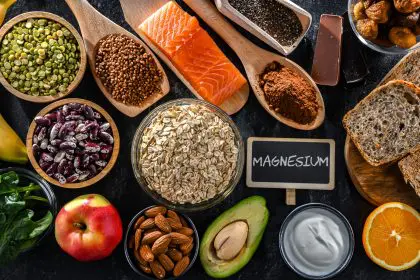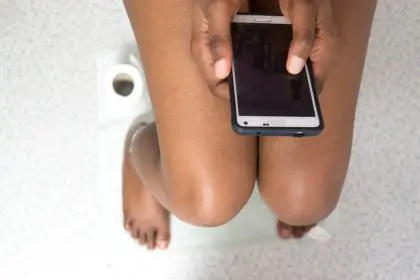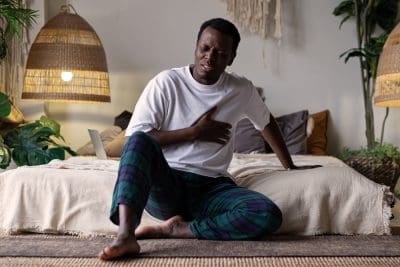At her Rejuvenere Health spa on Jonesboro Road, Dr. Donna Patterson isn’t just treating cardiovascular disease, she’s reframing the entire conversation around it, especially for a community that has historically maintained a wary distance from the healthcare system.
“One thing I want to point out is that African Americans don’t like going to the doctors, especially the male,” Dr. Patterson observes, her voice carrying the measured confidence of someone who has navigated this delicate terrain for years. “This may have stemmed from back in the days. We don’t trust the health system because of maybe the Tuskegee experiment.”
This statement might seem straightforward, even obvious to those familiar with the notorious 40-year study in which researchers withheld treatment from Black men with syphilis. But Dr. Patterson doesn’t merely note the mistrust, she actively addresses it through an approach that acknowledges historical wounds while offering practical paths forward.
Confronting the legacy of medical mistrust
The relationship between Black Americans and the medical establishment bears the weight of documented historical abuses. Beyond the infamous Tuskegee study, there’s a broader pattern of medical exploitation, from J. Marion Sims’ gynecological experiments on enslaved women to Henrietta Lacks’ cells being harvested without consent, that has fostered generational suspicion.
Dr. Patterson approaches this reality not as an abstract historical footnote but as a living barrier to care that must be acknowledged and addressed. “There’s a lack of trust where the healthcare system is concerned,” she notes, connecting past traumas directly to present-day health behaviors.
This mistrust manifests most clearly in preventive care avoidance. “Most people feel like they don’t need to see or go see a doctor if they’re not sick,” Dr. Patterson explains, highlighting a particularly dangerous mindset for conditions like hypertension that can silently damage the body for years before producing noticeable symptoms.
The consequences can be devastating. “High blood pressure is real, high blood pressure can cause stroke. High blood pressure can cause kidney failure,” Dr. Patterson emphasizes, outlining the cascade of damage that can occur while patients delay seeking care.
Navigating present-day bias in healthcare
While historical concerns drive some avoidance of medical care, Dr. Patterson also points to ongoing bias within the system itself. “There’s also researches that have been done that showed that when African Americans are in a hospital setting they do not get the same quality of care and referrals as does the other cultures,” she notes.
The manifestations she describes are specific and troubling: “If you ask for pain medication, you’re going to get push back, because now you’re seeking. If you need a cardiologist, you won’t be easily referred to see one, or you won’t be easily referred to see a neurologist as the others would be.”
These observations align with substantial research documenting disparities in pain management, specialist referrals, and treatment options provided to Black patients. A 2020 study in the New England Journal of Medicine found that Black patients received significantly fewer specialist referrals than white patients presenting with identical symptoms, while multiple studies have documented racial disparities in pain assessment and treatment.
For Dr. Patterson, acknowledging this double bind, historical reasons to avoid care coupled with present-day barriers to quality care, is essential to developing meaningful strategies for improving heart health in the Black community.
Self-advocacy as preventive medicine
Rather than simply lamenting these barriers, Dr. Patterson offers a pragmatic approach centered on knowledge and self-advocacy.
“First of all, what we should be aware of is our own health, and learn how to advocate for ourselves,” she advises. This includes understanding baseline health measures, recognizing warning signs, and being prepared to navigate healthcare interactions effectively.
But Dr. Patterson goes further, suggesting that the best form of advocacy is prevention that minimizes dependence on a flawed system. “Before you become a number in the health system, you want to start by prevention. You want to learn what can I do to take care of myself? So I don’t need to go to the hospital for high blood pressure.”
This approach represents both a health strategy and a subtle form of resistance, by maintaining optimal cardiovascular health through lifestyle measures, patients can reduce their exposure to settings where they might face bias or substandard care.
Specific guidance, not vague advice
When asked about the most effective intervention for heart disease, Dr. Patterson is unequivocal, “I would definitely say, healthy lifestyle.”
Unlike many medical professionals who offer this advice as a vague platitude, Dr. Patterson provides specific, actionable guidance:
- Sodium awareness: “Watching your sodium intake, reading food labels and making sure that you’re using fresh vegetables versus canned vegetables.”
- Strategic fat reduction: “Making sure that you’re reducing the amount of fat in your diet, dietary fat. You want to make sure that you’re doing good fat and using healthy oils instead of just eating, using vegetable oils that are unhealthy.”
- Portion control: “It’s not about what you eat so much, but how much of it that you consume, and so, being able to portion size your meal and eat healthier amount and not stuff yourself.”
- Regular movement: “Exercising, moving your body more.”
This specificity matters, particularly for a community facing disproportionate cardiovascular risk. Rather than simply telling patients to “eat better,” Dr. Patterson offers concrete guidance that acknowledges cultural food traditions while suggesting realistic modifications.
Recognizing warning signs
Perhaps most critically, Dr. Patterson addresses the tendency, particularly among men, to minimize potential cardiac symptoms.
“They’ll be having chest pain, and then like, ‘Oh, I’ll just go lay down for a little bit,'” she observes, noting that it’s often women who insist their male partners seek medical attention for concerning symptoms.
Her guidance on this point is emphatic, “When it comes to your chest area where your heart and your lung resides, do not put that off at all. Always seek help, even if it’s indigestion.”
The stakes of ignoring this advice couldn’t be higher. “It’s better to be told that it’s nothing than to find out that you had a heart attack, and now your heart is so badly damaged because you turned up too late that we can do nothing about it.”
Balancing cultural concerns with medical necessity
While lifestyle interventions form the cornerstone of Dr. Patterson’s approach, she also addresses the reality that many patients will require medication, and the particular resistance this can generate, especially among Black men.
“Most men especially may not want to take certain types of medication, because if you’re taking some specific types of blood pressure medication, it can cause erectile dysfunction,” she acknowledges, tackling directly a concern that patients may hesitate to raise but that significantly impacts medication adherence.
Dr. Patterson has seen the consequences of medication refusal firsthand. “I’ve actually had patients who said, ‘I don’t want to be on this medication. I don’t want to be on blood pressure medicine’ when their pressure is 197 over 112, which is extremely high.”
Her approach balances understanding with unvarnished honesty about the stakes. “Either you’re going to be on medication or you’re going to live healthy lifestyle. But one way or the other, if you are diagnosed with high blood pressure, this can kill you.”
By acknowledging legitimate concerns about side effects while emphasizing the potentially fatal consequences of untreated hypertension, Dr. Patterson creates space for informed decision-making rather than simple compliance or rejection.
Transforming cardiovascular outcomes through education
In a healthcare landscape often characterized by brief appointments and impersonal protocols, Dr. Patterson offers something different: a combination of medical expertise, cultural understanding, and practical wisdom. Her approach acknowledges systemic barriers without allowing them to become excuses for inaction, and recognizes cultural concerns without permitting them to justify dangerous health behaviors.
“We have to understand that it’s a choice,” she emphasizes. “Either you’re going to be on medication or you’re going to live healthy lifestyle.”
What Dr. Patterson ultimately provides is not just medical advice but a framework for cardiovascular health that centers patient agency within systemic constraints. It’s an approach that balances acknowledgment of historical and ongoing injustices with a refusal to let them dictate health outcomes.
In doing so, she offers not just hope for better heart health outcomes but a potential model for addressing other health disparities, one that neither ignores systemic factors nor absolves individuals of responsibility, but instead empowers informed navigation of an imperfect system while working toward its improvement.
As Dr. Patterson puts it with characteristic directness, “If you are diagnosed with high blood pressure, this can kill you, and so it is necessary that you take the steps to prevent having to be on the medication, in the first place.”
It’s a message of both caution and hope, delivered by someone intimately familiar with both the statistical realities of cardiovascular disparities and the lived experiences that shape them.













